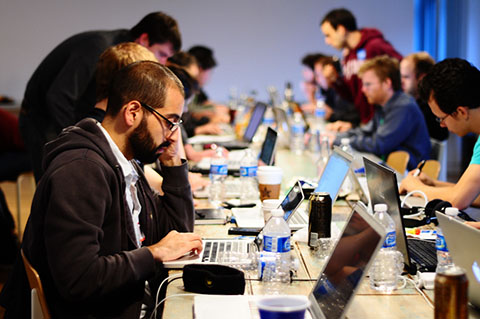Intel’s acquisition spree continues apace, with the latest being made to augment one of its other recent acquisitions. It is buying Hacker League, a popular platform for managing hackathons, which will be incorporated with the API management company Mashery (acquired April 2013). The terms of Hacker League deal are not being disclosed but we understand it is for a sum significantly smaller than the $180 million Intel reportedly paid for Mashery. Only the platform, IP and other assets are coming over to Intel; the three co-founders Mike Swift, Abe Stanway, and Ian Jennings, who are all in their early 20s, are not.
Oren Michels, Mashery’s founder who still runs the business, tells me that the idea behind the acquisition is to augment the developer outreach work that it already does on a daily basis. “We acquired the assets of Hacker League to take a product that makes hackathons great so that we could do more things to support developers,” he said. “It adds something that we can support the developer community with and eventually build parts into our core product over time.”
Adding Hacker League will mean that Mashery (and Intel) will be significantly ramping up their events for developers. Mashery is involved in some 80 hackathons annually, while Hacker League has powered some 460 events worldwide since October 2011, with a database of some 6,000 hacks from those events. (The hackathons it has powered have included editions of the one that kicks off TechCrunch Disrupt, our flagship conference.)
Mashery and Hacker League already had friendly relations before this, crossing paths in the hackathon circuit. “We have a lot of respect for Mashery,” Swift told me. “This is the best possible place for Hacker League to go. I got really excited by the idea of Mashery taking it to places where we couldn’t.”
Swift — who created Hacker League with Stanway and Jennings while the three were still students at Rutgers University — says that it had from the start been a side project, created more out of what they themselves wanted out of hackathons than really a startup in its own right. It was always bootstrapped, and until this past summer (when they started to consider what would happen with Hacker League longer term) was run more or less as a side project, with the three co-founders holding down day jobs at places like SendGrid, Etsy and PubNub. They are continuing with other projects post-sale. All three had been a part of the HackNY program, which organises university student hackathons among other things, and this could be called HackNY’s first exit. (Swift is continuing his interest in student hackathons; he’s the “commisioner” of Major League Hacking, vying to be the official league for intercollegiate, competitive student hackathons.
While Mashery already has an existing business targeting developers — which is beneficial overall for Intel and its mindshare in that community — it will be interesting to see how and where Hacker League’s platform gets used in the future. One area where Intel could use the platform would be in its own hardware-focused hackathons. And like other API-focused businesses like Appcelerator, Mashery itself is doing business with enterprises, helping them work on their own internal development, so potentially this could be used to help build out Mashery’s outreach in that area as well.
